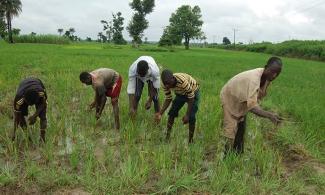
Rain-fed rice harvest usually begins from September in some of the producing states.
There are fears among stakeholders in the rice value chain that the flooding currently wreaking havoc on rice farms in producing areas will affect harvest in this year’s rain-fed circle.
According to Daily Trust, thousands of hectares of rice farms in Taraba, Jigawa, Kano, Benue, Niger, Kogi, Kebbi, among other producing states up North, have been reportedly washed away.
In the affected states, some of the farms were either at maturing stage or nearing the stage when the waters washed them away.
Rain-fed rice harvest usually begins from September in some of the producing states.
Rice is the most popular stable grains in the country, and the present administration has been paying much attention to its production since 2016, with indicators showing that the country is gradually becoming self-sufficient in its production.
Although the country has been experiencing flooding annually, affecting rain-fed rice farming, farmers and other stakeholders believe that the magnitude of this year’s floods might erode the country’s gains in rice production if urgent action were not taken.
Reports from Taraba State indicate that thousands of rice farmers in five local government areas have lost their farms to what some of them described as most devastating flooding that swept farms on both sides of River Benue, covering over 250 kilometres from Adamawa to Nasarawa State.
The area is the hub of rice production, and 90 per cent of the farms were destroyed by flood.
This, the farmers fear, may cause a possible shortage of paddy rice this year.
The affected farms covered thousands of hectares located in Karim-Lamido, Lau, Ardo-Kola, Gassol and Ibbi local government areas.
The farmers said the flood disaster was a double tragedy to them because they shifted their farming activities from the hinterland to the riverside to escape bandits’ attacks.
They said they were hoping for a bumper harvest before everything was destroyed by flood.
A female rice farmer at Mutumbiyu town in Gassol Local Government, Madam Rita John, said she borrowed N400,000 from one of the rice dealers, hoping to repay and make profit at harvest, but the farm was destroyed by flood.
She said she planted seven bags of rice seeds and was expecting to harvest more than 1,000 bags of paddy.
Another farmer, Abubakar Dauda, said he took a loan of N350,000 from a rice dealer and moved from the hinterland where he used to grow maize and other crops to the riverside because of banditry.
He also said the affected farmers were in dilemma because of the loans they took, which would be difficult to pay because of the situation at hand.
Large scale farmers are the bigger losers because many of them had invested millions of naira on rice farms.
The Taraba State chairman of the Rice Farmers Association, Tanko Bobbi Andami, confirmed that thousands of hectares of rice farms were destroyed in five local government areas of the state, indicating a looming crisis in the rice value chain.
The Commissioner for Agriculture in the state, Dr David Ishaya, said it was a national disaster. He called on the federal government, the North East Development Commission and the National Emergency Management Agency to assist rice farmers.
Reports from Benue State show that rice farmers are also counting losses.
As of Tuesday, some rice farmers whose fields in Makurdi and environs were submerged are pleading with the government to come to their aid.
A farmer, Kenneth Apaa said: “I have about 85 hectares of rice farm, but water has taken it over. It is pathetic. I spent over N10 million here and it is just a waste. It is so bad.
“I was thinking I would insure the farm this year. I have been into farming for about four years. This is the second time I am experiencing this. The first time, it was not as much as this.”